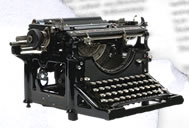WWI Books
Standard American history books offer plenty of facts about WWI, but reading essays, reviews, poetry, fiction and articles of the era provides a far deeper understanding of the cultural undercurrents, the ethical questions, and the national mood from the perspective of those who actually lived through the war.
WWI Books: Novels, Poetry, Reviews and Essays
The modernist movement was getting underway when the events of WWI started to unfold: Gertrude Stein, E.E. Cummings and others were forging new literary forms in an effort to better capture the rapidly changing modern world. When modernism coalesced after WWI, it would continue to impact literature, art, architecture, and music for decades.
At the same time, authors and poets wrote about the events of the war itself, producing what would become classic examples of WWI writing. Company K by William March and All Quiet on the Western Front by Erich Maria Remarque are among the most memorable novels, while Siegfried Sassoon, Robert Graves, Wilfred Owen, and others made the Great War vivid through poetry. Prominent critics responded to this and other WWI writing in respected periodicals like The Saturday Review, Vanity Fair, The Atlantic Monthly, and The Saturday Review of Literature.
Those wanting to gain greater insight into the wide-ranging effects of WWI, and on the art that was produced during the '20s and '30s, can find a number of original articles at OldMagazineArticles.com. You'll also find original writing on society, fashion, transportation, film, and other aspects of WWI culture available for download.
